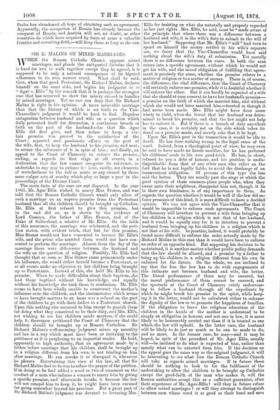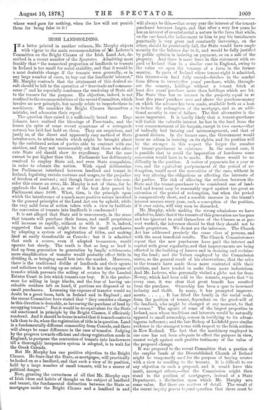SIR R. MALINS ON MIXED MARRIAGES.
WHEN the Roman Catholic Church opposes mixed marriages, and pleads the antiquated doctrine that it is hard for two to walk together except they be agreed, it is supposed to be only a natural consequence of its bigoted adherence to its own narrow creed. What shall be said, then, when that good Protestant, Sir Richard Malins, declares himself on the same side, and begins his judgment in re "Agar v. Ellis" by the remark that it is perhaps the strongest case that has occurred to show the misery caused in families by mixed marriages. Yet no one can deny that Sir Richard Manus is right in his opinion. A more miserable marriage than that the history of which is set forth in the Vice- Chancellor's judgment it would be hard to find. Hopeless antagonism between husband and wife on a question which daily presented itself for discussion, a continuous breach of faith on the part of the husband—for that Mr. Agar Ellis did first give, and then refuse to keep, a cer- tain promise was proved to the satisfaction of the Court ; repeated and passionate efforts on the part of the wife, first, to keep the husband to his promise, and next, to secure the substance of it in spite of him ; and finally, an appeal to the Court of Chancery to enforce the promise, ending, as regards its first stage at all events, in a declaration that the law cannot recognise its existence, or undertake in any way to enforce it : here, surely, are elements of wretchedness to the full as acute as any caused by those more vulgar acts of cruelty which play so large a part in the proceedings of the Divorce Court.
The main facts of the case are not disputed. In the year 1863, Mr. Agar Ellis wished to marry Miss Stonor, and was told that the Roman Catholic Church would only allow of such a marriage on an express promise from the Protestant husband that all the children should be brought up Catholics. Mr. Ellis at first refused to give this promise, but in the end did so, as is shown by the evidence of Lord Camoys, the father of Miss Stonor, and of the Duke of Sutherland, a relative of Mr. Ellis. On the faith of this assurance, the marriage was celebrated, and the peti- tion states, with evident truth, that but for this promise, Miss Stonor would not have consented to become Mr. Ellis's wife, and the priest who married them would not have con- sented to perform the marriage. Almost from the day of the marriage there were differences between the husband and the wife on the question of religion. Possibly, Mr. Ellis had thought that as soon as Miss Stonor came permanently under his influence, she would either herself become a Protestant, or at all events make no objection to her children being brought up as Protestants. Instead of this, she held Mr. Ellis to his promise. When he made difficulties about their baptism, she had them baptised without his knowledge, and equally without his knowledge she took them to confession. Mr. Ellis seems to have been wholly unable to counteract the mother's influence over the children, and the circumstance which seems to have brought matters to an issue was a refusal on the part of the children to go with their father to a Protestant church. Upon this nothing else occurred to him except to punish them for doing what they conceived to be their duty, and Mrs. Ellis, not wishing to see her children made martyrs, if she could help it, thereupon petitioned the Court of Chancery that the children should be brought up as Roman Catholics. Sir Richard Malins's well-meaning judgment mixes up morality and law in a way which must have been as irritating to the petitioner as it is perplexing to an impartial reader. He held, apparently on high authority, that an agreement made by a father before marriage that his children shall be brought up in a religion different from his own, is not binding on him after marriage. He can revoke it or disregard it, whenever he pleases. Entertaining this view of the law, all that Sir Richard Malins had to do was to refuse the prayer of the petition. If in doing so he had added a word or two of comment on the conduct of a man who induces a woman to marry him by giving a specific promise, and afterwards breaks it because the law will not compel him to keep it, he might have been excused for going somewhat beyond his province. But a great part of Sir Richard Malins's judgment was devoted to lecturing Mrs. Ellis for insisting on what she naturally and properly regarded as her just rights. Mrs. Ellis, he said, must be "made aware of the principle that where there was a difference between a husband and wife, it is the wife's duty to submit to the will of her husband." Supposing that Mr. Ellis's "will" had been to spend on himself the money settled to his wife's separate use, we fancy that the Vice-Chancellor would have said nothing about the wife's duty of submission. Yet morally there is no difference between the cases. In both the man enters into a specific agreement, without which he would not get his wife, and the moral obligation of fulfilling that agree- ment is precisely the same, whether the promise relates to a matter of religion or to a matter of money. There is, of course, the difference, the vital difference, that the Court of Chancery will certainly enforce one promise, while it is doubtful whether it will enforce the other. But it can hardly be expected of a wife that she should at once consent to have her husband's promise— a promise on the faith of which she married him, and without which she would not have married him—treated as though it had never been made. Mrs. Ellis might have done more wisely to yield, when she found that her husband was deter- mined to break his promise, and that the law might not help her to enforce it. But if there is a breach of duty anywhere in the case, it is certainly not on the side which takes its stand on a promise made, and merely asks that it be kept. Upon Mr. Ellis's part in the transaction it would be idle to dwell. He has done nothing wrong in the legal sense of the word. Indeed, from a theological point of view, he may even be said to have made an heroic sacrifice, for he has preferred his childrens' souls to his own good-faith. He has, in short, refused to pay a debt of honour, and his position is undis- tinguishable from that of any other man who relies on the fact that he is not legally liable, to avoid the discharge of an inconvenient obligation. Of persons of this type the less said the better. They are usually past the stage at which the good opinion of those common-place people who, when they swear unto their neighbour, disappoint him not, though it be to their own hindrance, is of any importance to them. As regards the question whether it would be well if the law did en- force promises of this kind, it is more difficult to have a decided opinion. We can not agree with the Vice-Chancellor that it would be impossible to enforce such agreements. The Court of Chancery will interfere to prevent a wife from bringing up her children in a religion which is not that of her husband, and it would be equally easy for it to interfere to prevent a husband from bringing up his children in a religion which is not that of his wife. In practice, indeed, it would probably be found more difficult to enforce the order actually made by Sir Richard Malins in this case than it would have been to enforce an order of an opposite kind. But supposing his decision to be maintained, it is another matter whether public policy demands that the law should be altered, and a promise by a father to bring up his children in a religion different from his own be enforced for the future. On the whole, we are inclined to say that the less the law has to do with engagements of this intimate sort between husband and wife, the better. The literal performance of them may be ensured, but the moral performance of them cannot be ensured, and the spectacle of the Court of Chancery vainly endeavour- ing to follow a husband through all the expedients by which he might break his promise in the spirit, while keep- ing it in the letter, would not be calculated either to enhance the dignity of the law or to promote the happiness of families. If the obligation to leave the religious education of the children in the hands of the mother is understood to be simply an obligation in honour, and not one in law, it is more likely to be honourably carried out than if it is treated as one which the law will uphold. In the latter case, the husband will be likely to do just so much as he can be made to do, and no more. In the former case, he may—and it may be hoped, in spite of the precedent of Mr. Agar Ellis, usually will—be inclined to do what is expected of him, rather than merely what can be extorted from him. If the decision on the appeal goes the same way as the original judgment, it will be interesting to see what line the Roman Catholic Church will take as regards mixed marriages. If in future there should be nothing to look to for the fulfilment of the undertaking to allow the children to be brought up Catholics except the good-faith of the man who makes it, will the Roman authorities accept this as a sufficient guarantee, after their experience of Mr. Agar-Ellis ? will they in future refuse to allow mixed marriages ? or will they attempt to distinguish between men whose word is as good as their bond and men whose word goes for nothing, when the law will not punish them for being false to it?































 Previous page
Previous page